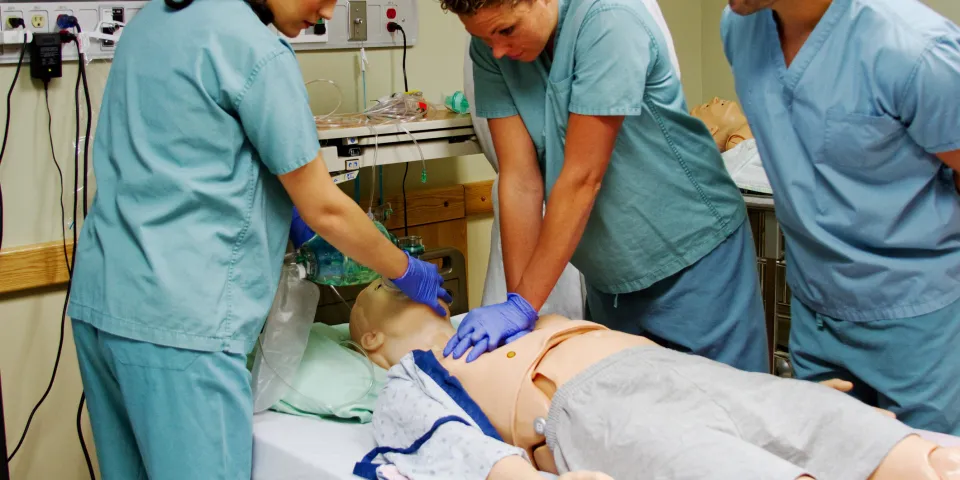Latest
Key Benefits of Nursing Simulation (SIM) Labs
May 3, 2021

Simulation (SIM) labs provide immersive and hands-on learning experiences for nursing and healthcare students. They are built to mimic various healthcare settings such as emergency rooms, hospital rooms, labor and delivery rooms, and operating theaters to fully immerse students in the clinical experience. In addition to the realistic environment, these labs are furnished with mannequins and medical equipment.
How are nursing simulations run?
Nursing students apply their theoretical knowledge in carefully created and diverse scenarios that are structured to promote learning. SIM labs are usually divided into three sections:
- Pre-briefing: Students are provided a preliminary briefing before they enter the simulation. This is similar to the reports and charts that nurses are provided when beginning a shift, which includes patient information and details on their condition. Depending on the situation, nursing students may also be told how they will be reviewed throughout the SIM experience.
- Scenario: A case study specific to the course and nursing specialization will then be carried out in the SIM. Nursing students will respond to the scenario as if they were in a real-life situation. The educator and other nursing students will either interact in the room itself or may watch and listen through a one-way mirror or remotely through a video transmission.
- Debriefing: After the case study, nursing students reflect on their actions and identify challenges, opportunities and areas for improvement. The nursing educator also provides specific feedback on what could have been done differently and advice for future improvement.
While the idea of treating a scenario and mannequin might seem a little awkward to nursing students, SIM labs offer many key benefits:
Safe Space to Practice
Students can practice nursing skills and psychomotor, critical thinking, decision-making, and bedside manner skills while in the SIM lab. In a controlled environment, they have the ability to relax, practice and try new things without jeopardizing the health and safety of a patient.
Forgetting to run a specific test or misdiagnosing an illness can be detrimental to a patient, but SIM labs offer students a safe space to learn and make mistakes. Using certain equipment, such as a catheter or feeding tube, for the first time can also be intimidating, but again, the SIM lab is the perfect place for students to learn and correct mistakes without harming a patient.
Builds Confidence
Being able to safely practice nursing skills in a controlled environment helps students build confidence and trust in their own abilities. Repetition and different scenarios help students perfect their skills. By the time they’re comfortable in the SIM lab, they should also be comfortable working with real patients.
When a student learns about a condition or skill, it is usually in a controlled, low-stress environment. In real-life situations, they might have to make quick life-changing decisions in a couple of seconds. Some nursing SIM labs try to replicate this stressful environment, to help students understand how to stay composed and make decisions when dealing with similar circumstances on the job.
Enhances Problem-Solving Abilities
Removing the pressure of making a life-threatening mistake allows students to ask important questions and think through complex problems. Students may feel as though the scenario is stressful and will be forced to think quickly, but they’ll also be asked to think outside of the box for solutions. When working in the SIM lab, students are encouraged to explore all potential solutions and outcomes.
Improves Teamwork and Communication Skills
Simulations provide students an opportunity to practice team communication with hospital staff, their fellow nursing peers, other medical professionals and the patient. According to one research study, these communication skills are not replaceable by classwork – the best way to learn is through hands-on experience. In the lab setting, instructors will observe how nurses handle patient interactions and offer advice for improving communication.
SIM labs represent an innovative method of teaching and learning by providing a multifaceted and multi-sensory experience for students to fully immerse themselves in a controlled nursing environment.
SIM labs have become even more invaluable over the last year because they offered students a safe space to practice skills even during the coronavirus pandemic – which necessitated social distancing. They will be an essential part of the educational experience for nurses for years to come.
Learn More About Our Nursing Programs
Bureau of Labor Statistics (BLS), U.S. Department of Labor, Occupational Employment and Wage Statistics 2023 / Occupational Outlook Handbook 2022. BLS estimates do not represent entry-level wages and/or salaries. Multiple factors, including prior experience, age, geography market in which you want to work and degree field, will affect career outcomes and earnings. Herzing neither represents that its graduates will earn the average salaries calculated by BLS for a particular job nor guarantees that graduation from its program will result in a job, promotion, salary increase or other career growth.
Latest
Recent Blog Posts
Subscribe to our Newsletter
Get the latest news you need to know, from study hacks to interview tips to career advancement. Have it delivered right to your inbox biweekly.











